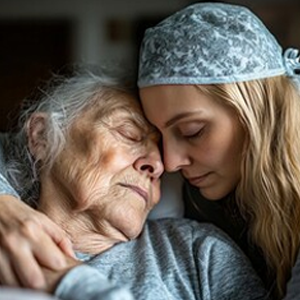
End-of- Life Care
End-of-life care refers to the support provided to individuals who are in the final stages of a terminal illness or have a limited life expectancy. The goal of end-of-life care is to ensure the comfort and dignity of the individual, managing symptoms such as pain, nausea, or difficulty breathing, while also offering emotional and psychological support.
At Maksanus Home Care, we focus on making this transition as peaceful as possible by offering personalized care that can include pain management, emotional support, help with daily tasks, and assistance with making important end-of-life decisions. Our services allow individuals to remain at home surrounded by loved ones, in the comfort of a familiar environment.
Why Choose End-of-Life Care with Maksanus Home Care?
Compassionate, Person-Centered Approach:
- We believe that everyone deserves to experience a dignified and peaceful end of life. Our care plans are tailored to the specific needs and preferences of the individual, ensuring their comfort and honoring their wishes in a compassionate, respectful manner.
Emotional and Psychological Support:
- Facing the end of life can bring a range of emotions, including fear, sadness, or anxiety. Our caregivers offer emotional support, providing a listening ear and helping both the individual and their family cope with the emotional challenges during this time.
Pain and Symptom Management:
- Managing pain and other distressing symptoms is a central aspect of end-of-life care. We work closely with healthcare professionals to ensure that the individual is comfortable and free from unnecessary pain, offering assistance with medications and comfort measures as needed.
Supporting Families and Caregivers:
- End-of-life care is also a time for families to receive support. We provide respite care, allowing family members to rest or attend to other responsibilities. Our team is here to provide guidance, answer questions, and offer emotional support for those involved in the care process.
Respect for Cultural and Spiritual Beliefs:
- We understand that spirituality and cultural practices can play a significant role in the end-of-life experience. Our caregivers are sensitive to these needs, and we encourage open conversations to ensure that your loved one’s spiritual, religious, or cultural beliefs are respected and integrated into their care plan.
